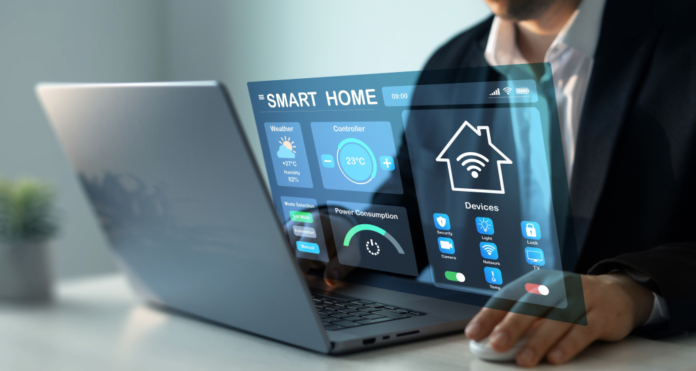It feels nice to know that we live in a time where homes with intelligent voice assistants and remotely controllable appliances are possible.
Having a smart home is everyone’s dream homes. Which makes sense because who doesn’t want to own a home whose lights, thermostats, curtains, and even appliances cater to their personal preferences.
All of this is possible due to the IoT technology that allows your smart devices to form a network with each other. Smart home appliances can learn your preferences because each appliance shares sensor-generated data with the others.
This data includes your voice commands, temperature preferences, or visual data like video feeds.
Sounds cool, right?
But have you wondered where this data goes?
Well, it can go nowhere (stored in your system), or it can be misused terribly, which is exactly why you should know about the cybersecurity concerns associated with smart homes.
Cybersecurity Concerns in Smart Homes
Data is the gold of today’s modern world. No wonder it is considered the currency of the digital economy. It can help different organizations in so many ways.
Plus, your smart home is a gold mine, where data is being produced every minute. This is why it can become a target of hackers or companies can access it to sell it to third parties, for a lot of money.
Here is how your smart home can be a risk:
- Data Leak or Data Theft
Smart home devices, in some cases, are not secure. They are rushed to the market without proper security testing. This means, more often than not, they have serious security loopholes, which cyber criminals can misuse.
Devices like baby monitors, doorbell cameras, and lounge cameras can be hacked to expose the inside view of your home. This means a hacker can easily know when you are not home. Not to forget, they can also misuse the videos of your children.
- Network Hacking
Your smart home devices form a network to exchange information. This network is easily vulnerable to hacking attempts, which means all your data can be easily accessed.
But that is not only it. It exposes every device connected to that network, which means your smartphones, which usually hold important personal and financial information.
- Personal Security
Since most IoT devices are very easy to hack, criminals can easily gain access and control them. While they cannot do much by controlling smart washing machines or refrigerators, they can control your smart security devices. This means your smart locks for your doors and windows can be easily disarmed, which can put you and your family in danger.
Ways to Mitigate Cybersecurity Concerns
Despite the smart home technology being vulnerable to security lapses, it does not mean that we should not use it. The purpose of talking about these cybersecurity concerns was to inform you so that you can take the necessary steps to make your smart home safer.
Here are some tips that you can use to mitigate these cybersecurity concerns.
- Create Separate Networks
If you create a separate network for all your IoT devices, then you can prevent your other devices, like smartphones and PC, from getting impacted. In case any of your IoT devices get hacked, then your other devices, which are connected to your original network, can be safe. This way, the hacker will be unable to access your personal devices through the network.
- Make Your Network Safer
You can decrease the chances of your network getting hacked through your IoT devices by investing in internet security. For that, you can talk to your ISP, as most Internet service providers in the US provide internet security. This includes Wi-Fi network security, which strengthens your Wi-Fi against hacking attempts.
For instance, if you have Spectrum Internet, you get access to their security suite that protects your Wi-Fi and your devices from online threats. To know more, you can contact Spectrum customer service and get guidance on making your smart home safer.
Apart from these, you can get stronger passwords and multifactor authentication. Activating firewalls will also protect your devices against these cybersecurity concerns. You can also use an advanced router that has more security capabilities. Doing these basic things will help you ensure that your smart home is safer and your data is protected. This way, you can enjoy the convenience of your smart home in peace, without worrying about your data being leaked.

